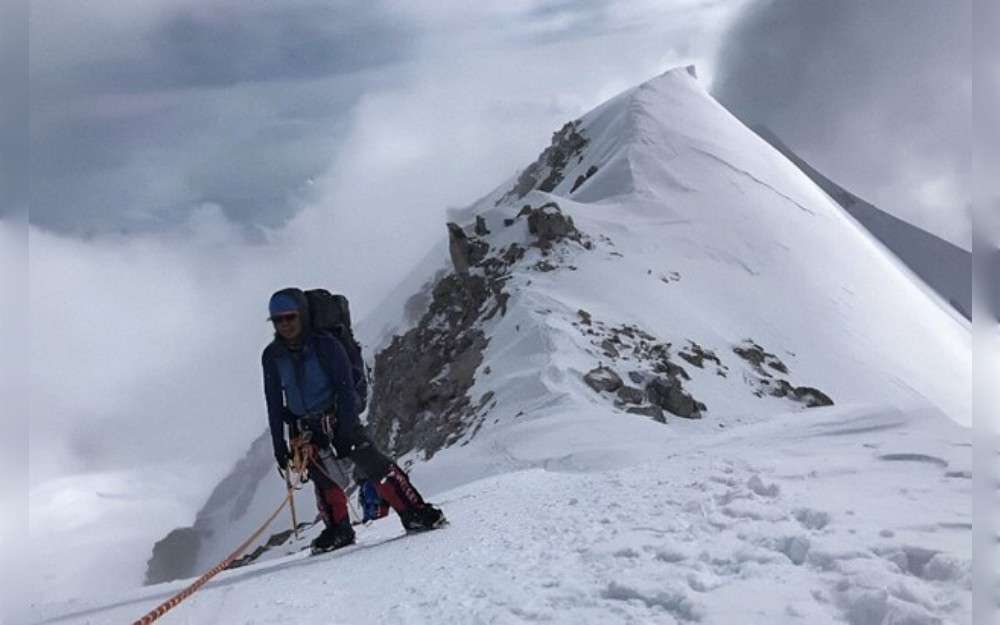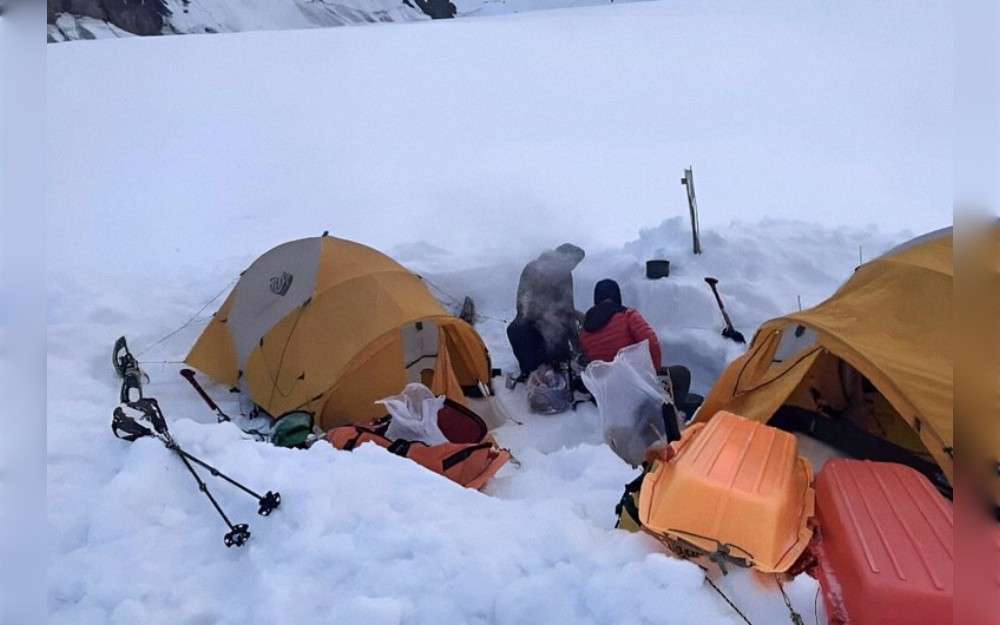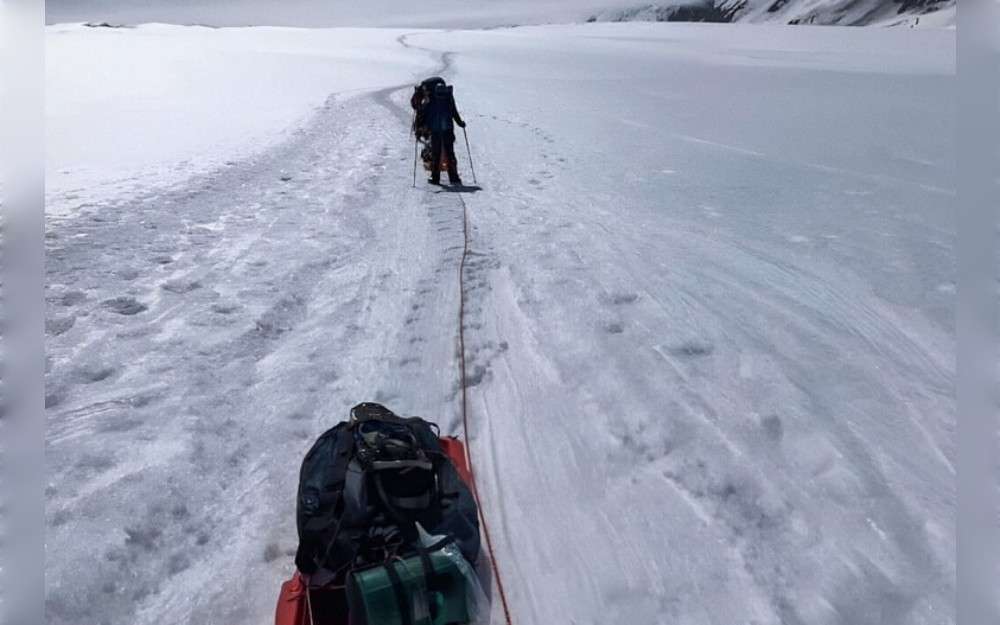Malaysian mountaineer Ayob Yahaya discusses Mount Denali challenges, days after his friend died near the summit.
Iman Muttaqin Yusof/Kuala Lumpur

For Ayob Yahaya, a veteran mountaineer from tropical Malaysia, climbing snow-capped mountains offers a unique challenge.
His 2019 conquest of North America’s highest peak, the 6,914-meter (20,322-foot) Mount Denali in Alaska, remains a special achievement but the recent death of his friend, Zulkifli Yusof, on that mountain has cast a shadow.
Zulkifli, whose body was expected to arrive in Malaysia on Saturday, was climbing with partners identified as Zainudin Lot and Illaham Ishak, both 47, who were injured but survived. Illaham returned to Malaysia and was being treated in Kuala Lumpur; Zainudin stayed longer in Alaska to arrange for repatriation of Zulkifli’s remains, according to a relative and the men’s mountaineering club.
“Compared to some of the other mountains that I’ve climbed, Denali offers its own uniqueness in terms of how you climb it because it is completely snow-capped,” Ayob, 61, told BenarNews.
Illaham recounted descending alone from the Denali’s Football Field – a flat glacier at 5,974 meters (19,600 feet) – to seek help for his friends after they were unable to descend from the summit.
“I actually went down to find a private helicopter to go directly to pick up [Zulkifli] at the Football Field, but there was no service, only rangers, and they couldn’t go up because of the bad weather,” Illaham told reporters after returning to Malaysia last weekend.
He said his descent took more than 15 hours.
“No one walks alone there, everyone is roped together, but I had no rope, I had to descend no matter what,” he told reporters after returning to Malaysia. “When I descended, I found the rescue team and informed them about the condition of Zainudin Lot and Zulkifli above.”
He said the rescuers expressed concern for his condition.
“The [park] rangers looked at my hands and feet and said I had high-altitude pulmonary edema and told me to come down immediately and not wait long,” he said.
Zulkifli, who died on May 29, was the third fatality on Denali this season, according to Alaskan media. His body is scheduled to be buried on Saturday at the Muslim Cemetery in Taiping, Perak, his home state, according to the Alpine Club Malaysia.
The club previously said Zulkifli’s suspected cause of death was high-altitude cerebral edema and hypothermia.

The American Alpine Institute, an expedition guide, said the greatest challenge for many climbers on Denali is simply living in cold, snowy conditions day after day.
A study on mountaineering fatalities showed that about 1,000 climbers from around the world attempt Denali each year.
‘The mountain doesn’t discriminate’
Ninety-six climbers died between 1903 and 2006 on the Alaskan mountain formerly known as Mount McKinley, according to a 2008 study by researchers from the University of Utah who noted that “climbers from Asia had the highest odds of dying.”
Ayob, who has been climbing for two decades, said the study did not do justice to him and other Asian climbers.
“The mountain doesn’t discriminate between Asians and others, right? To some extent, there may be some truth to it, but many circumstances can arise, such as extreme weather and temperatures.
“We have a lot of world-class climbers from Asia,” he said, adding that those climbers often take higher risks compared to those from other regions.
Commenting on the Utah study, Andrew Luks, a professor at the University of Washington, said decision-making in changing conditions, rather than a lack of prior exposure to snow and cold because of one’s ethnicity, is a key issue on Denali.
“It’s possible but the death rates may have changed in the intervening time,” the professor in the Division of Pulmonary, Critical Care and Sleep Medicine told BenarNews. “[I]t does not vary based on your ethnicity as people of any background are susceptible to this problem.
“For example, when the weather is bad, does a group know whether to stay put and not move from their camp that day or decide to try and move up or down the mountain?”

Luks, who was part of the 2012 rescue team for Japanese climbers buried by an avalanche on Denali, said slow-moving groups face increased risks caused by fatigue and dehydration, leaving them vulnerable to deteriorating weather, route conditions, or acute altitude illness.
“If a group is moving to the summit on summit day and the winds are picking up, temperatures dropping and/or the group is moving slowly and taking too much time, do they make a decision to turn around or press ahead?” he said.
‘Long, slow trek’
The Denali climb can take up to 20 days, depending on weather conditions.
“It could force you to wait longer than you really want to be,” Ayob said. “It’s a long, slow trek where you have to acclimate yourself before the summit push.”
While a guide company is not needed to climb North America’s tallest summit, the service could cost as much as U.S. $11,000, Ayob said. Other costs include flights and equipment.
Ayob, who serves as a spokesman for the Alpine Club Malaysia, said few insurance providers offer protection for high-altitude climbs but such policies for a month-long climb cost about $500.
Many Malaysians find those costs to be too steep because of the currency exchange rate – $1 equals close to 5 ringgit.
‘Seven Summits’
The three Malaysians stranded on Denali in late May were pursuing the “Seven Summits” challenge, which involves climbing the highest peak on each continent. Denali is known for its severe weather and steep climbs, according to National Geographic.
Mount Everest in Nepal is Asia’s and the world’s tallest mountain at 8,848 meters (29,029 feet). The tallest mountains on the other continents are Aconcagua in South America, 6,962 meters (22,828 feet); Denali; Kilimanjaro in Africa, 5,895 meters (19,341 feet); Elbrus in Europe, 5,642 meters (18,510) feet; Vinson Massif in Antarctica, 4,892 meters (16,050 feet); and New Guinea’s Carstensz Pyramid in Oceania/Australia, 4,892 meters (16,024 feet).
Mohd Noor Mat Amin from Jejak Pensolo Resources, a group assisting mountaineers to trek Mount Everest base camp in Nepal, said climbers must prepare physically and mentally before starting any treks.
“Asians are capable of hiking any mountain on Earth, but the crucial aspect is proper preparation before starting the climb. That is the most important.
“Regardless of our experience in Malaysia, or any others, each mountain is unique in terms of terrain, climate, and weather. These are all unpredictable factors. Hence, thorough preparation is a must,” Noor, an avid solo hiker, told BenarNews.
Ili Shazwani Ihsan in Kuala Lumpur and Nani Yusof in Washington contributed to this report.
Copyright ©2015-2024, BenarNews. Used with the permission of BenarNews














